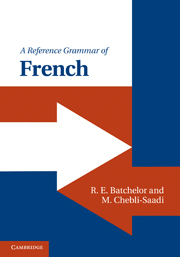Book contents
- Frontmatter
- Contents/Table des matières
- Preface/Préface
- Acknowledgments/Remerciements
- Brief introduction to the French language (with reference to the French of francophone countries)/Brève introduction à la langue française (avec référence au français des pays francophones)
- Part I
- Part II
- Part III
- Part IV
- Part V
- Part VI
- 52 Adjectives/Les adjectifs
- 53 Adverbs/Les adverbes
- 54 Comparative adjectives, adverbs and nouns/Les adjectifs, les adverbes et les noms comparatifs
- 55 Superlative adjectives, adverbs and nouns/Les adjectifs, les adverbes et les noms superlatifs
- Part VII
- Part VIII
- Part IX
- Part X
- Part XI
55 - Superlative adjectives, adverbs and nouns/Les adjectifs, les adverbes et les noms superlatifs
from Part VI
Published online by Cambridge University Press: 05 June 2012
- Frontmatter
- Contents/Table des matières
- Preface/Préface
- Acknowledgments/Remerciements
- Brief introduction to the French language (with reference to the French of francophone countries)/Brève introduction à la langue française (avec référence au français des pays francophones)
- Part I
- Part II
- Part III
- Part IV
- Part V
- Part VI
- 52 Adjectives/Les adjectifs
- 53 Adverbs/Les adverbes
- 54 Comparative adjectives, adverbs and nouns/Les adjectifs, les adverbes et les noms comparatifs
- 55 Superlative adjectives, adverbs and nouns/Les adjectifs, les adverbes et les noms superlatifs
- Part VII
- Part VIII
- Part IX
- Part X
- Part XI
Summary
The following passage describes the Winter Olympics that took place in Canada in 2010. It evokes the great enthusiasm and passion generated by this four-yearly event. Much of the action depends on the snow which, in recent years, has not proved so reliable. This almost proved the case in Vancouver, but the weather came to the rescue as the games were about to start. The piece illustrates the use of superlatives which are highlighted in bold. A few translations are provided. Some further comments: The Latin in fine has a didactic connotation with the meaning provided in the text. The expression planète bleue means the Earth, doubtless as it appears blue from outer space, as opposed to planète rouge which signifies Mars.
Les Jeux olympiques de Vancouver
Dans la Grèce antique, les Jeux olympiques étaient organisés tous les quatre ans près de la ville d'Olympie. Les pays extrêmement puissants ont développé des trésors d'imagination pour célébrer des rencontres sportives au niveau international. Les meilleurs athlètes de la planète bleue s'entraînent régulièrement pour battre le record mondial et décrocher la médaille d'or dans leur spécialité. En février 2010, les Jeux olympiques de Vancouver offrent un spectacle des plus exaltants et dégagent des émotions on ne peut plus intenses. Les sportifs de haut niveau entrent dans une vive compétition qui suscite les passions et les ardeurs les plus folles. Les plus chevronnés [seasoned/experienced] montent sur le podium pour afficher leur victoire.[…]
- Type
- Chapter
- Information
- A Reference Grammar of French , pp. 548 - 554Publisher: Cambridge University PressPrint publication year: 2011



